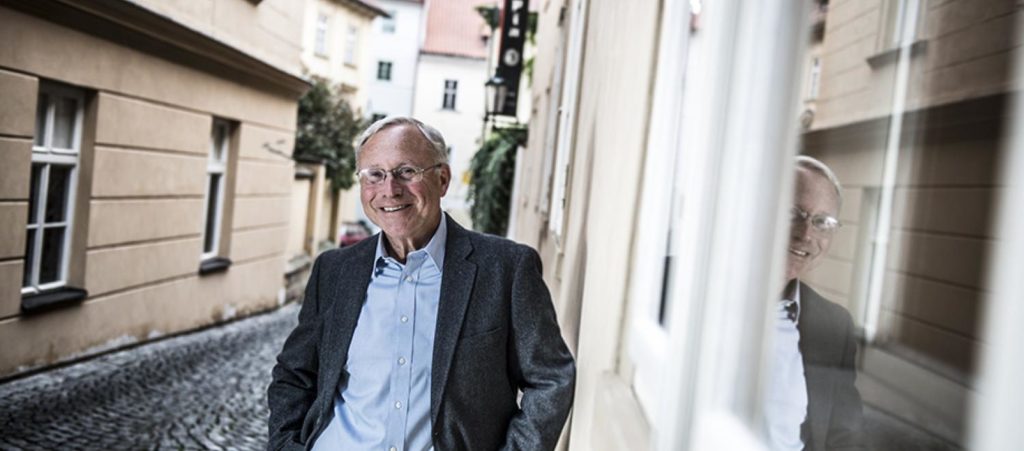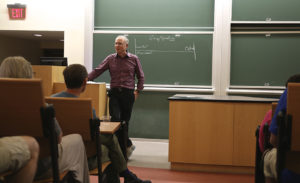
“You’re gonna like the way you look.”
George Zimmer, the gravel-voiced founder and CEO of Men’s Wearhouse, delivered the line in countless television commercials that touted his clothing stores, punctuating each ad with the promise, “I guarantee it.”
Zimmer peddled suits, slacks, shirts and ties with the fervor of a guy selling Adam his first fig leaf — he was the face, strategic lead and soul of the company. But for many years, and in many ways, Charlie Bresler, M.A.’83, Ph.D.’84, was its spine.
Bresler joined Men’s Wearhouse in 1992 at the behest of Zimmer, a childhood friend, to start an employee-training program. He would go on to head human resources, stores, and marketing, and ascend to the position of company president. By 2008 he was a likely choice to be named the successor to Zimmer.
And then he walked away.
It turns out that while he may have liked the way he looked, Charlie Bresler didn’t like the way he felt.
“When I stepped down in 2008 I wanted to do something more socially valuable,” he says, “and something in keeping with my values.”

Reunion 2015.
He found his grail as executive director of The Life You Can Save, an advocacy and educational outreach organization that “raises awareness for the more than one billion men, women and children who live in extreme poverty.” Charlie and his wife Diana have been the primary funders of the organization that helps direct donations to 17 distinct charities serving people who subsist on less than $1.25 a day, the global poor suffering from malnutrition, lack of clean water, disease and few educational opportunities.
To trace his journey from the corporate suite to the nonprofit world requires a step back. Bresler’s story involves reconciling the conflicting elements of his own nature — the radical with the capitalist, the family man with the executive — and aligning his values with his actions. The path was decidedly nonlinear and included a significant stop at Clark University.
The son of emotionally troubled parents (his mother was institutionalized when he was 11), Bresler grew up as an idealist intent on upending the worst impulses of the United States’ social and political order. He attended New York University, where he protested the Vietnam War and joined radical student groups as a “low-level activist.” He earned a master’s degree in history at Harvard while Diana did her undergrad work, and taught high school history for three years before leaving the profession. Bresler had become disillusioned by what he viewed as the skewed high school socialization process “where we teach students who is talented and who is untalented, who is cool and who is not cool.”
What followed was a period of his life that he often uses the word “wander” to describe. He “wandered” into a job as a teaching pro at a tennis club, where he was “kind of happy but not engaged in the way I’d been in the antiwar movement.” He then “wandered” into a job as a psychology technician in a day treatment center. “I carried a pager and did assessments of acutely psychotic people in emergency rooms, which I had no business doing because I had no background in it,” he says. “For about five years I was doing that and playing tennis. When Diana was accepted into medical school at UMass, I decided to get my Ph.D. in psychology at Clark.”
Here, he found Professor Jim Laird.
“We got along incredibly well, and he wrote me a spectacular letter of recommendation that got me into Clark,” Bresler says. The two grew close, with Laird becoming a mentor, offering insight into the complicated subject of human personality.
“I had an amazing experience at Clark. The philosophical approach as opposed to the more practical approach really resonated. It was a very stimulating time for me intellectually.”
It turned out I was a good business person, and the sales training program raised the average transaction 13 percent, which is just enormous in retail. It was luck, partly, but it was also the wonderful training I’d had at Clark that I was able to convert in a retail environment.
After graduating, he took a job at the California School of Professional Psychology in Fresno — a bad decision, he acknowledges.
“By that point I was not so clinically oriented, and I didn’t appreciate the orientation of the school. I really didn’t know all that until I got there.” Though he wasn’t thrilled with his position, life was comfortable. Bresler, always a good athlete, began running marathons. He and Diana had two children, Noah and Kayla.
At the school’s urging, he secured a grant and opened an anxiety clinic, in which he taught graduate students to treat anxiety disorders from a behavioral perspective. The clinic thrived for two years until he and Diana decided to relocate to the San Francisco Bay Area. “I said to Diana, if you get a job there, I’ll just figure something out for myself. I thought I’d probably start another anxiety clinic.”
Enter George Zimmer.
He and Charlie had grown up together outside of New York City. Zimmer founded Men’s Wearhouse with a college friend in 1973, building it into a nationally recognized retail chain. In 1993, a year after the company had gone public, Zimmer approached his old friend with a request: Would Charlie create a training program for his employees?
The notion of doing something entirely new was tempting, especially given that Bresler had been pondering the possibility of earning more money. “The door was open to anything that was not an overt violation of my principles,” he says. Zimmer’s offer was compatible with his desire to provide for his family. He accepted.
“It turned out I was a good business person, and the sales training program raised the average transaction 13 percent, which is just enormous in retail,” he says. “It was luck, partly, but it was also the wonderful training I’d had at Clark that I was able to convert in a retail environment.”
His decision to join Men’s Wearhouse initially left his family “perplexed and critical,” Bresler recalls. Years later he would write a letter to his son, Noah, explaining (but not justifying) how he came to work in an enterprise that seemed such a dramatic departure for him.
“I spent all those years at Men’s Wearhouse being a dad, a husband, an executive. I had a very successful career, which, given my background, just seems weird,” he says with a laugh. “I found that I had natural leadership ability, which had become dormant during my high school years. I did the work, and I worked really hard.”
In 2008, after fifteen years with the company, Bresler entered Zimmer’s office and told him he was done. He wasn’t suffering from an existential crisis, but he knew he wanted to strike in a new direction. With the board’s approval, the two negotiated an agreement that allowed Bresler to become a consultant for Men’s Wearhouse, a relationship that continued until last year. (Zimmer was ousted as CEO by the board of directors several years ago.)
It’s important to keep the concept of perfection in front of you at all times, but realize you’re never going to hit it. You try to get closer each year, not by leaps and bounds, but by setting goals that you can achieve and which stretch you in every area of life.
The search for a new challenge led Bresler to the writings of Princeton University ethicist Peter Singer, a founder of the “effective altruism” movement, which makes the case that extreme poverty can be eliminated through regular donations to charities with proven track records of aiding the global poor. Intrigued, Charlie and Diana met with Singer and agreed to fund Singer’s philanthropic organization, The Life You Can Save.
“For every dollar we spend, we believe we move at least three or four dollars to highly effective charities,” Bresler says.
The nonprofit deals only with international charities, generally in sub-Saharan Africa and South America. Bresler explains that the level of deprivation in these countries dwarfs that in the United States and other developed nations, and a dollar goes further in combating the panoply of problems faced by those populations.
Each charity promoted by The Life You Can Save is rigorously evaluated by the organization and outside agencies for its level of impact, which is the true measure of effectiveness, he says. In the U.S., Bresler notes, evaluations of charities are overly focused on overhead, perpetuating the myth that operational efficiency always wins the day.
“Unfortunately, there are charities that get high ratings for not spending money, and others that spend more money and have way more impact that get weak ratings,” he says.
Bresler, who now lives with Diana outside Seattle to be near their children, returned to Clark University last September to speak at Family Weekend. Among the observations he shared was the notion that while we are imperfect creatures, nothing prevents us from aspiring to do worthy things in this world.
“It’s important to keep the concept of perfection in front of you at all times, but realize you’re never going to hit it,” Bresler says. “You try to get closer each year, not by leaps and bounds, but by setting goals that you can achieve and which stretch you in every area of life.”
Realizing this can lead to an enhanced sense of personal satisfaction, maybe something approaching peace.
He can practically guarantee it.
Charlie Bresler encourages people interested in helping The Life You Can Save to contact him at charlie.bresler@thelifeyoucansave.org.


